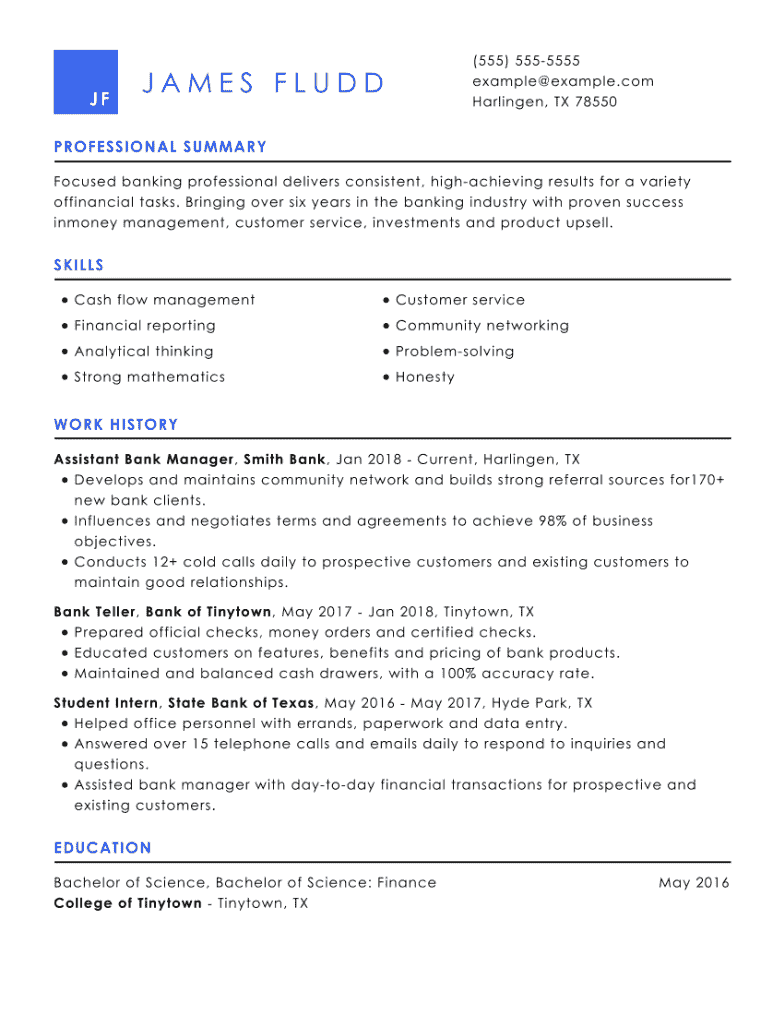Banking CV examples to help you succeed this year
Banking professionals need a variety of skills and talents for success in the field. How can you show all of these off in your CV?
Banking professionals need a variety of skills and talents for success in the field. How can you show all of these off in your CV?





OUR USERS HAVE BEEN HIRED BY

The banking industry is one of the most important industries that most people don’t think about regularly. However, if it weren’t for banking professionals helping with loan applications, allowing you to open new accounts and generally helping with financial services, people wouldn’t be able to make financial transactions. If you’re interested in becoming one of the people who provide these services, there are many ways to prove you have the necessary skills. Here’s what you need to know about creating the perfect CV for a banking job title.
A banker CV may look different than a typical CV depending on the specific banking position you’re aiming for. If you’re hoping to get a job in any of these areas, you might benefit from a professional CV explanation for the banking industry:
In general, recruiters are looking for similar skills with all of these job titles. While the CV writing process will definitely be different for each job title, use the guidance in this article to help with any and all of them.
Typically, hiring managers are looking for a solid skills section and certifications for jobs in this industry. The importance of work history will vary depending on which job you’re pursuing. Entry-level job titles will typically place less importance on relevant experience and more importance on how well you understand the skills you’re supposed to be proficient in.
Speaking of your skills section, what should you include? Depending on the job and your CV format, you’ll generally want to list at 8-10 relevant skills, which may include:
Both hard skills (technical skills) and soft skills are important for banking CVs. Technical skills are certainly important here for jobs that require knowledge of financial processes and software. However, you’ll also be interacting with customers all day, so you need to know how to talk to people effectively. Certain banking experts, like investment bankers, may need more soft skills, as you might be talking to customers more frequently.
Your experience section will vary depending on what specific job you’re pursuing. An entry-level job likely doesn’t need professional experience, while a managerial job may require more experience in the field. Lead off this section with any professional work you’ve had, and add any related academic, internship and even volunteer experiences if you’re short on standard work history. If you had cash management responsibilities at a previous job, you can include that, even if the job isn’t directly related to banking.
If you have gained some achievements (such as recognition as an employee of the month) through previous banking experiences, include them in a separate achievements and awards section of your CV.
Many certifications are either required or recommended for a banking CV template. For example, you may choose to get one of these certifications, especially if you’re planning on making banking your long-term career goal:
Applicant tracking systems (ATS) which employers use to scan your CV for keywords, will likely be looking for these types of certifications if they’re present in the job description. Make sure you include these certifications if you have them.
If you’re looking to create a great banking CV, having banking CV samples available to review can be a major plus. You can find hundreds of CV examples at CVHelp, including plenty of banking CV samples for any job title. Our CV builder is also a great starting point for any CV, including a banking CV.
Tips for Creating Your Banking CV:
It’s always a good idea to submit a cover letter with your banking CV. An investment banking cover letter example can help you see what a cover letter will really look like, which will help you create the best one for your needs. Even if the job description doesn’t require a cover letter, adding one will boost your chances of getting the job.
Yes. You just need to angle for entry-level banking jobs. There are plenty of roles, and the more you work on these entry-level jobs, the better your chances of eventually working up the ladder. Just don’t assume that you can get a higher-level job with no experience.
Personalising your banking CV for each job posting is key to landing the job. The more you personalise your CV to the job posting, the more likely you’ll be to have a hiring manager actually call you back. This helps you tailor your CV to exactly what the hiring manager wants to see in a candidate.
We personalize your experience.
We use cookies in our website to ensure we give you the best experience, get to know our users and deliver better marketing. For this purpose, we may share the information collected with third parties. By clicking “Allow cookies” you give us your consent to use all cookies. If you prefer to manage your cookies click on the “Manage cookies” link below.